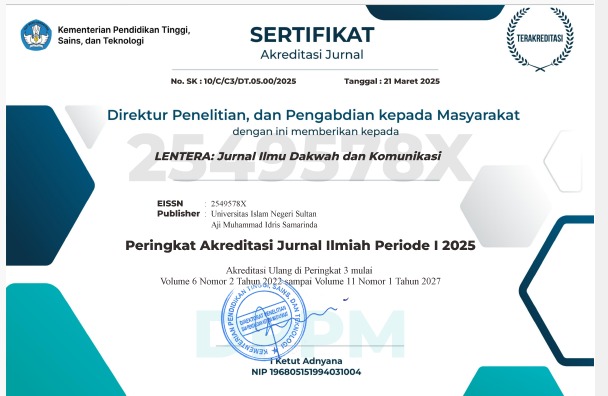Cultural Preaching on Modern Society: A Phenomenological Study of an Islamic Foundation in Kudus
Abstract
Rapid changes in both rural and urban societies require da’wa to be delivered more creatively. This paper aims at investigating the development of cultural da’wa by analyzing the dynamics of socio-cultural life in an Islamic da’wa institution named Yayasan Pendidikan Islam Kyai Thelingsing (YPIKT). This paper applies a qualitative phenomenological approach. Finding reveals that the cultural da’wa approach to the urban community was manifested in three ways: education, cultural heritage (grave pilgrimage), and recitation. On the education aspect, the YPIKT has four levels. The cultural heritage is shown by Haul Mbah Kyai Thelingsing activity, which attended whether Muslim and non-muslim (Chinese descendent) every Muharram. The recitation aspect has an ultimate goal this activity is happened every day after Maghrib or every Thursday night by the name of tahlilan.
Keywords: Da’wa, Cultural, Community, Modern, Education
References
Alatas, A. (2000). Tatanan politik dunia Abad 21 Dalam Indonesia Abad 21: Di Tengah Kepungan Perubahan Global. Kompas.
Alwisol. (2004). Psikologi Kepribadian. Penerbitan Universitas Muhammadiyah Malang.
Arifin, A. Z. (2013). Charisma and rationalisation in a modernising Pesantren: Changing values in traditional Islamic education in Java. 97.
Asmaji. (1997). Paradigma Dakwah Terkini. Perpustakaan Islam dan Penyiaran Ilmu Pengetahuan.
Asmaji. (2017). Antropologi Tafsir Al -Quran. Simposium Nasional Al-Qur’an.
Aziz, Moh. A. (2004). Ilmu Dakwah. Kencana.
Azra, A., & Jamhari. (2006). Pendidikan Islam Indonesia dan Tantangan Globalisasi: Perspektif Sosio Historis (D. A. Burhanuddin, Ed.). Rajawali Press.
Bensaid, B. (2013). On Islamic Da‘wah and Sustainable Development. World Journal of Islamic History and Civilization, 3(2), 48–56. https://doi.org/10.5829/idosi.wjihc.2013.3.2.3201
Cahyadi, A. (2018). Pengembangan Dakwah Melalui Gerakan Kebudayaan. Jurnal Ilmiah Syi’ar.
Djauhari, M. T. (2008). Masa Depan Pesantren: Agenda Yang Belum Terselesaikan. Taj Publishing.
Hatta, H. Mohd. (2016). Da’wah in the Modern Age: Strategies against Extremism and Fundamentalism Model Da’wah Pasca Modern dan Strategi Penolakan Fundamentalisme Radikal dalam Dakwah. Jurnal Sultan Alauddin Sulaiman Shah, 3(2), 251–256.
Hew, W. W. (2018). The Art of Dakwah: Social Media, Visual Persuasion and The Islamist Propagation of Felix Siauw. Indonesia and the Malay World, 46(134), 61–79. https://doi.org/10.1080/13639811.2018.1416757
Jamaluddin, A. N. (2015). Sosiologi Pedesaan. Pustaka Setia.
Mahfudz, S. A. (n.d.). Hidayatul Mursyidin Ila Thuruq al-Wa’zi wa al-Khitabat. Darul Ma’rifat.
Millie, J. (2017). Hearing allah’s call: Preaching and performance in Indonesian Islam. In Hearing Allah’s Call: Preaching and Performance in Indonesian Islam. Cornell University Press.
Muchtar, A., & Alam, N. A. R. (2019). Da’wah Ecology: The Concept of Education and Development Da’wah in A Whole. Humanities & Social Sciences Reviews, 7(4), 730–735. https://doi.org/10.18510/hssr.2019.7493
Muhammadiyah, P. P. (2004). Dakwah Kultural Muhammadiyah. Suara Muhammadiyah.
Muhidin, A. (2002). Dakwah Islam Dalam Prespektif Al-Qur’an: Studi Kritis Atas Visi, Misi, Dan Wawasan. Pustaka Setia.
Munzier. (2006). Metode Dakwah. Kencana.
Muslimin. (2020). Kajian Dakwah Kultural Pondok Pesantren Tahfidz Kiai Marogan Palembang Dalam Mengembangkan Masyarakat Islam. Jurnal Komunikasi Islam Dan Kehumasan.
Nasional, M. P. (2003). Undang-Undang RI No. 20 Tahun 2003, Tentang Sistem Pendidikan Nasional. Sinar Grafika.
Sahin, A. (2018). Critical issues in islamic education studies: Rethinking islamic and western liberal secular values of education. Religions, 9(11). https://doi.org/10.3390/rel9110335
Shihab, M. Q. (1995). Membumikan Al-Qur’an, Fungsi dan Peran Wahyu dalam Kehidupan Masyarakat, (Sepuluh). Mizan.
Soebahar, Abd. H. (2013). Kebijakan Pendidikan Islam Dari Ordonasi Guru Sampai UU Sisdiknas. Raja Grafindo Persada.
Steenbrink, K. A. (1986). Pesantren, Madrasah, Sekolah: Pendidikan Islam Dalam Kurun Moderen. LP3ES.
Sukmadinata, N. S. (2000). Landasan Psikologi Proses Pendidikan. Remaja Rosdakarya.
Zimmerer, T. W. (1996). Entrepreneurship and New Venture Formation. Upper Saddle River.
Copyright (c) 2021 LENTERA

This work is licensed under a Creative Commons Attribution-ShareAlike 4.0 International License.
Penulis yang menerbitkan artikel di Lentera: Jurnal Ilmu Dakwah dan Komunikasi setuju dengan ketentuan berikut:
- Penulis memiliki hak cipta artikel dan memberikan hak jurnal untuk publikasi pertama dengan karya yang secara simultan dilisensikan di bawah CC-BY-SA atau The Creative Commons Attribution – ShareAlike Licence.
- Penulis dapat membuat perjanjian kontrak tambahan yang terpisah untuk distribusi non-eksklusif versi jurnal yang diterbitkan dari karya tersebut (misalnya, mempostingnya ke repositori institusional atau menerbitkannya dalam sebuah buku), dengan pengakuan atas publikasi awalnya di jurnal ini.
- Penulis diizinkan dan didorong untuk memposting pekerjaan mereka secara online (misalnya, dalam repositori institusional atau di situs web mereka) sebelum dan selama proses pengajuan, karena dapat menyebabkan pertukaran yang produktif, serta kutipan yang lebih awal dan lebih besar dari karya yang diterbitkan (Lihat The Effect of Open Access)
Authors who publish articles in Lentera: Jurnal Ilmu Dakwah dan Komunikasi agree to the following terms:
- Authors retain copyright of the article and grant the journal right of first publication with the work simultaneously licensed under a CC-BY-SA or The Creative Commons Attribution–ShareAlike License.
- Authors are able to enter into separate, additional contractual arrangements for the non-exclusive distribution of the journal's published version of the work (e.g., post it to an institutional repository or publish it in a book), with an acknowledgment of its initial publication in this journal.
- Authors are permitted and encouraged to post their work online (e.g., in institutional repositories or on their website) prior to and during the submission process, as it can lead to productive exchanges, as well as earlier and greater citation of published work (See The Effect of Open Access).












.png)
